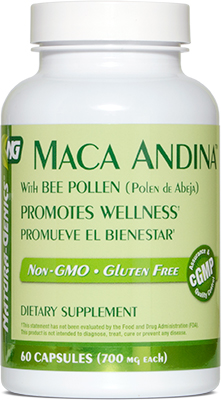60 Capsules • 700 mg
Native Peruvians have consumed maca since pre-Incan times for both nutritional and medicinal purposes. Maca has a higher nutritional value compared to most food crops grown there. It is rich in sugars, protein, starches, and essential nutrients.
This unique plant is also referred to as Peruvian ginseng (even though maca is not considered part of the ginseng family). Maca has been used for many centuries in the Andes to promote fertility in humans and animals.
In Peruvian herbal medicine today, maca is used as a immunostimulant, for cases of anemia, tuberculosis, menstrual disorders, menopause symptoms, sterility, and to enhance cognitive activity.
The nutritional value of maca root is high. It contains 60 to 75 percent complex carbohydrates, 10 to 14 percent protein, 8.5 percent fiber, and 22 percent lipids. The protein content of maca exists mainly in the form of polypeptides and amino acids including significant amounts of arginine, serine, histidine, aspartic acid, glutamic acid, glycine, valine, phenylalanine, tyrosine, and threonine. Maca also has about 250 mg of calcium, 2 grams of potassium, and 15 mg of iron in 100 grams of dried root, along with plenty of fatty acids including linolenic, palmitic, and oleic acids. In addition to its rich supply of vitamins and minerals, maca root contains sterols, alkaloids, tannins, and saponins.
Bee pollen is very high in protein and carbohydrates. It contains trace amounts of minerals and vitamins. Bee pollen is used in Traditional Chinese Medicine (TCM) and also used by the nutraceutical industry for nutritional supplements. Although it has been recommended for a number of applications, it is particularly used to enhance athletic performance and the relief of allergies.
Bee pollen is used as an energy enhancer and sometimes used by athletes to improve sports performance during competitions. It is also taken in cases of hay fever on the theory that pollen intake will help build up resistance. When used for this purpose, locally grown Bee pollen is usually recommended. Other uses of bee pollen are to improve cognitive activity and other effects of aging.
One tablespoon of bee pollen contains: 16 calories, 240 mg of fat, 1.2 grams of protein, 2.18 grams of carbohydrates, and 250 types of nutrients, including vitamins and flavonoids.
| Supplement Facts | ||
| Serving Size: 1 Capsule | ||
| Servings per Container: 60 | ||
| Amount per 1 Capsule | %DV* | |
| Organic Maca Root (Lepidium meyenii) | 625 mg | * |
| Bee Pollen | 75 mg | * |
| *Daily Value not established | ||
Other Ingredients: Gelatin.
Recommendations: As a dietary supplement, take one (1) capsule daily.
Caution: Do not use this product if pregnant or nursing. Do not use
this supplement if the band around the cap is broken or missing.
If symptoms persist, consult a doctor. Keep this product out of reach
of children.
Storage: Keep tightly closed in a dry place and do not expose
to excessive heat.
The statements above have not been evaluated by the Food and Drug Administration (FDA).
This product is not intended to diagnose, treat, cure or prevent any disease.





